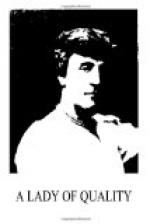crouching to leap. But it was not Osmonde who
felt this, he saw only that she changed colour, and
having heard the story of her girlhood, a little chill
of doubt would fall upon his noble heart. It
was not doubt of her, but of himself, and fear that
his great passion made him blind; for he was the one
man chivalrous enough to remember how young she was,
and to see the cruelty of the Fate which had given
her unmothered childhood into the hands of a coarse
rioter and debauchee, making her his plaything and
his whim. And if in her first hours of bloom
she had been thrown with youthful manhood and beauty,
what more in the course of nature than that she should
have learned to love; and being separated from her
young lover by their mutual youthful faults of pride
and passionateness of temper, what more natural than,
being free again, and he suing with all his soul, that
her heart should return to him, even though through
a struggle with pride. In her lord’s lifetime
he had not seen Oxon near her; and in those days when
he had so struggled with his own surging love, and
striven to bear himself nobly, he had kept away from
her, knowing that his passion was too great and strong
for any man to always hold at bay and make no sign,
because at brief instants he trembled before the thought
that in her eyes he had seen that which would have
sprung to answer the same self in him if she had been
a free woman. But now when, despite her coldness,
which never melted to John Oxon, she still turned
pale and seemed to fall under a restraint on his coming,
a man of sufficient high dignity to be splendidly
modest where his own merit was concerned, might well
feel that for this there must be a reason, and it
might be a grave one.
So though he would not give up his suit until he was
sure that ’twas either useless or unfair, he
did not press it as he would have done, but saw his
lady when he could, and watched with all the tenderness
of passion her lovely face and eyes. But one
short town season passed before he won his prize;
but to poor Anne it seemed that in its passing she
lived years.
Poor woman, as she had grown thin and large-eyed in
those days gone by, she grew so again. Time
in passing had taught her so much that others did
not know; and as she served her sister, and waited
on her wishes, she saw that of which no other dreamed,
and saw without daring to speak, or show by any sign,
her knowledge.
The day when Lady Dunstanwolde had turned from standing
among her daffodils, and had found herself confronting
the open door of her saloon, and John Oxon passing
through it, Mistress Anne had seen that in her face
and his which had given to her a shock of terror.
In John Oxon’s blue eyes there had been a set
fierce look, and in Clorinda’s a blaze which
had been like a declaration of war; and these same
looks she had seen since that day, again and again.
Gradually it had become her sister’s habit
to take Anne with her into the world as she had not




